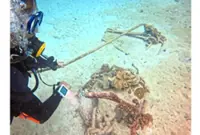PROF Vishna Devi Nadarajah’s decision to pursue a master’s degree in health professions education 10 years after completing her PhD in biochemistry has reaped rewards not only for herself, but also for global medical education.
Recently, the International Medical University (IMU) deputy vice-chancellor (Institutional Development and International) became the second Malaysian and Asian – after the late IMU co-founder Dr Mei Ling Young, who was honoured in 2017 – to be bestowed with the Association for the Study of Medical Education (ASME) Gold Medal.





